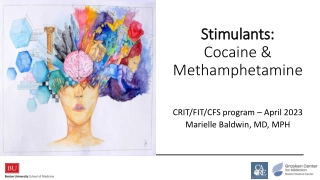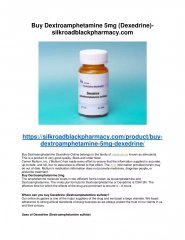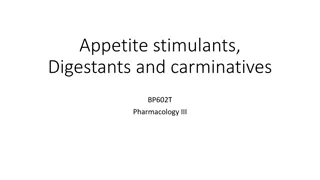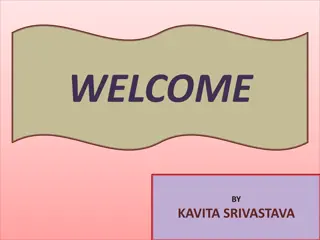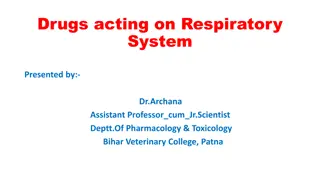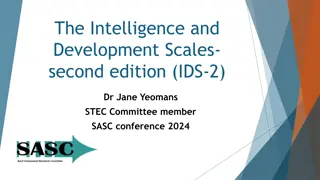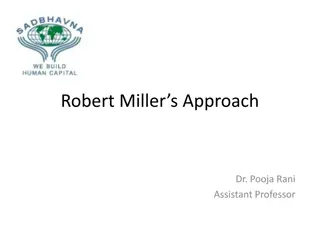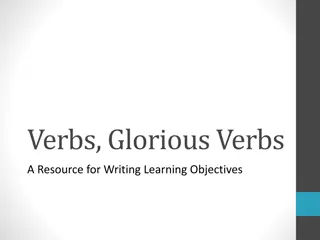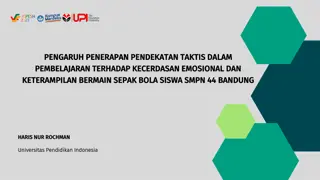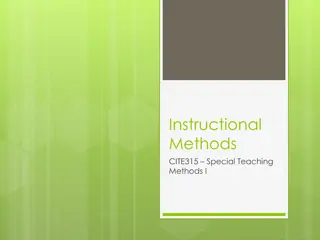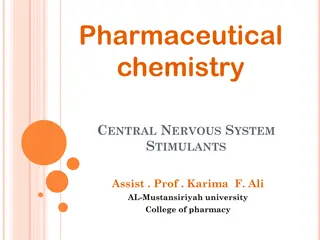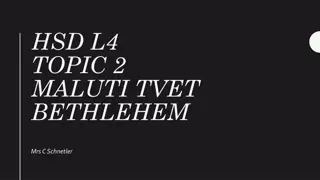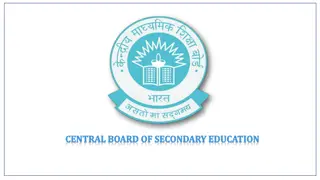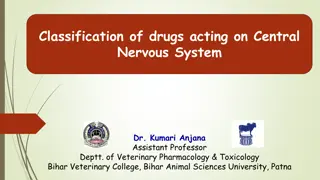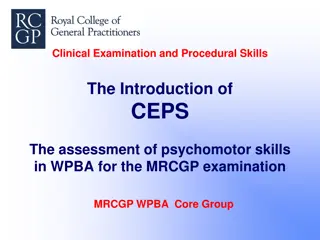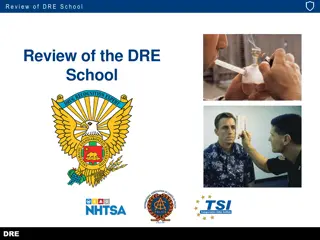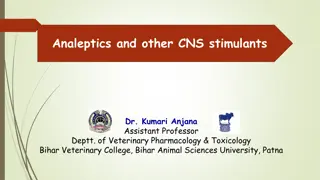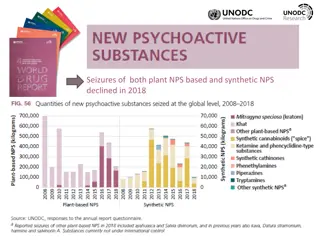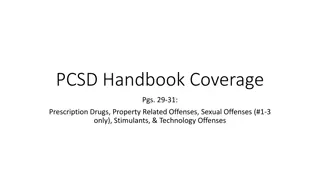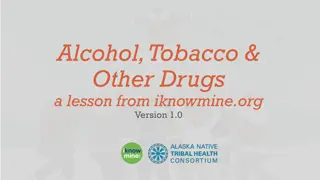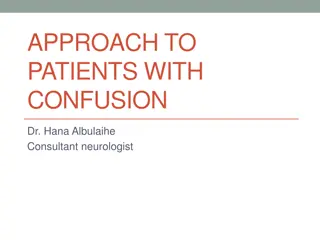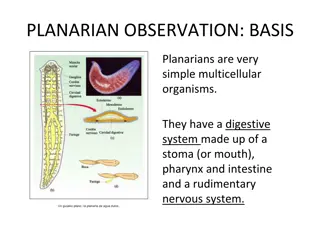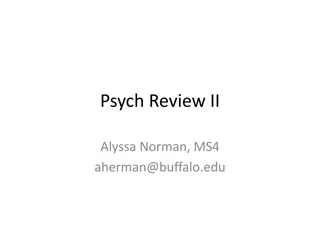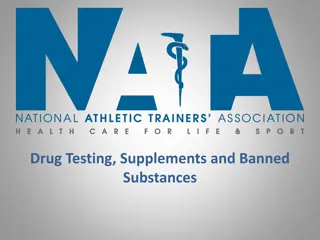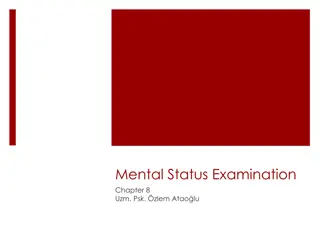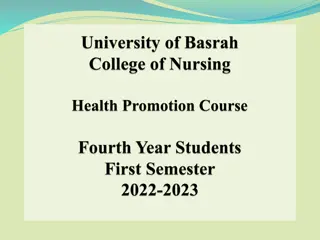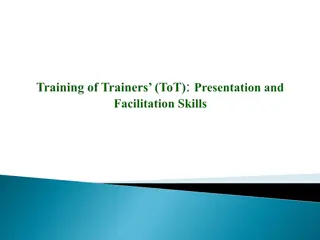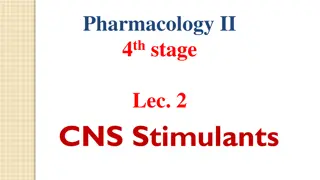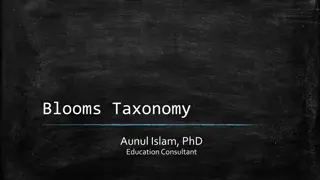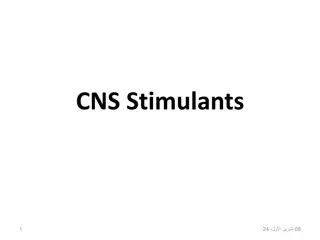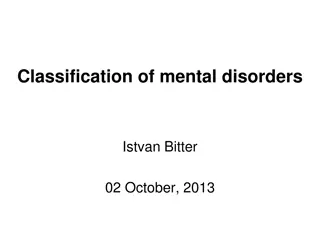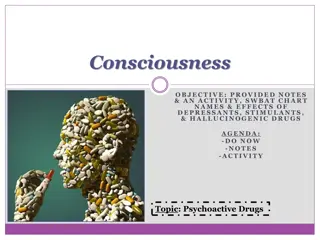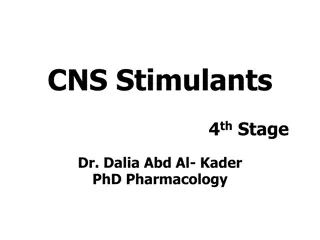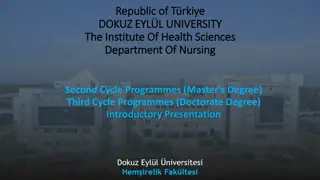Stimulants: Cocaine & Methamphetamine
Basics of cocaine and methamphetamine, including their history, medical complications, treatment options, and techniques to manage overamping.
0 views • 39 slides
Buy Dextroamphetamine 5mg - silkroadblackpharmacy.com
Buy Dextroamphetamine Dexedrine Online belongs to the family of medications known as stimulants. This is a product of very good quality. Book and order Now!\n\nCerner Multum, Inc. (\u2018Multum\u2019) has made every effort to ensure that the information supplied is accurate, up-to-date, and full, bu
1 views • 2 slides
Comprehensive Guide to Workshop Organization and Implementation
Workshops play a crucial role in developing psychomotor skills and practical knowledge in education. Defined as a group of individuals meeting to enhance skills through study, research, and practice, workshops involve active participant involvement and focus on practical experiences. Essential featu
1 views • 15 slides
Appetite Stimulants, Digestants, and Carminatives in Pharmacology III
Appetite is influenced by various factors including hypothalamic peptides, catecholaminergic pathways, and serotoninergic signaling. Loss of appetite, like anorexia, can stem from both physical and psychological causes. Alcohol can stimulate gastric secretion but chronic consumption may reduce appet
0 views • 8 slides
Understanding New Psychoactive Substances (NPS) and Their Categories
New Psychoactive Substances (NPS) are substances of abuse not regulated by international drug conventions, posing significant public health risks. These substances can fall under categories like synthetic cannabinoids, stimulants, hallucinogens, and depressants, each with unique risks and effects. S
0 views • 11 slides
Understanding Bloom's Taxonomy and Educational Objectives
Explore the comprehensive concept of Bloom's Taxonomy and Educational Objectives developed by Prof. Benjamin S. Bloom and his associates. Learn about the cognitive, affective, and psychomotor domains, instructional objectives, and the interrelation of educational activities in shaping learners. Disc
1 views • 35 slides
Understanding Drugs Acting on the Respiratory System for Effective Treatment
Explore the classification and actions of drugs targeting the respiratory system, including antitussives, expectorants, respiratory stimulants, bronchodilators, and mucolytics. Discover how these medications work to suppress coughs, promote fluidity of bronchial secretions, and stimulate respiratory
0 views • 14 slides
Comprehensive Overview of the Intelligence and Development Scales - Second Edition (IDS-2)
The Intelligence and Development Scales - Second Edition (IDS-2), developed by Dr. Jane Yeomans, is a comprehensive assessment tool for individuals aged 5 to 21. It includes cognitive and general development domains, with subtests covering intelligence scales, executive functions, psychomotor skills
0 views • 25 slides
Understanding Robert Miller's Approach in Skill Development
Robert Miller's approach, originating in military science, emphasizes writing objectives for the psychomotor domain with a focus on skill analysis and physical activities. The method involves three key elements: Indication (Stimulus), Activation (responses), and Feedback. It aims to develop skills a
0 views • 9 slides
Crafting Effective Learning Objectives Using Action Verbs
Crafting measurable learning outcomes involves focusing on student behaviors, using specific action verbs, selecting appropriate assessment methods, and setting clear performance criteria. The checklist provided emphasizes the importance of observable and measurable outcomes, incorporating active ve
7 views • 27 slides
Impact of Tactical Approach on Emotional Intelligence and Soccer Skills in Junior High School Students
Study conducted at SMPN 44 Bandung investigated the effects of applying a tactical approach in learning on emotional intelligence and soccer skills of students. Results show a significant impact on both aspects, with recommendations for using tactical approach in teaching soccer to enhance cognitive
0 views • 7 slides
Effective Teaching Methods for Special Education
In this set of resources, you will explore the Direct Instruction Method, which encompasses explicit teaching strategies to effectively convey both concepts and skills. You will delve into the roles of both teachers and students within this method, as well as the characteristics and benefits of Dire
0 views • 50 slides
Overview of Central Nervous System Stimulants in Pharmaceutical Chemistry
Central Nervous System Stimulants encompass a diverse group of agents with various effects on the CNS, including analeptics, methylxanthines, central sympathomimetic drugs, and antidepressants. Analeptics are potent CNS stimulants with limited use, while methylxanthines like caffeine have widespread
4 views • 41 slides
Theories of Human Development in Psychomotor Domain
The psychomotor domain involves the development of muscle skills associated with mental processes. Psychomotor development progresses through cognitive, associative, and autonomic stages, where individuals learn to perform new skills that involve both the body and mind. In the cognitive stage, one n
0 views • 12 slides
Advancing Assessment in Education: Focus on Holistic Progress and Feedback
Embracing a shift in educational assessment, the focus is on promoting student learning and development through regular formative assessments. The NEP mandates emphasize competency-based evaluations, self-assessment, and interactive tools for student progress tracking. Holistic Progress Cards offer
1 views • 20 slides
Classification of Drugs Acting on Central Nervous System
The Central Nervous System (CNS) plays a crucial role in coordinating the body's functions and responses to the environment. Drugs acting on the CNS can be classified into CNS stimulants and CNS depressants. CNS stimulants include spinal, medullary, and cortical stimulants, with various direct and i
0 views • 10 slides
Modernizing Assessment Methods in Medical Training
This content discusses the transition from mandatory DOPS assessments to Integrated DOPS within the framework of the Trainee ePortfolio for the MRCGP examination. It introduces a new competency called Clinical Examination and Procedural Skills (CEPS) and outlines the changes in assessment methods, r
0 views • 12 slides
Current Trends in Recreational Drug Use: Insights and Implications
The trends in recreational drug use have evolved over time, with a shift towards Novel Psychoactive Substances (NPS) such as Synthetic Cannabinoids, Designer Stimulants, and Designer Opioids. Marijuana remains a focal point, now legal in some states for both medicinal and recreational purposes. The
2 views • 26 slides
Review of DRE School and Drug Evaluation Techniques
Explore key topics such as the definition of drugs for DRE purposes, basic drug statistics, review of symptomatology, and vital signs assessment in the context of Drug Recognition Expert (DRE) training. Learn about CNS depressants, stimulants, hallucinogens, and analogs, as well as vital signs like
0 views • 29 slides
Understanding CNS Stimulants: An Overview
Central Nervous System (CNS) stimulants are drugs that stimulate and improve brain functions. They counteract CNS depression caused by various factors but can have adverse effects if overdosed. Categories include psychostimulants, brain stem stimulants, convulsants, and psychotomimetics. Examples su
4 views • 11 slides
Trends in New Psychoactive Substances Seizures and Use
Seizures of both plant-based and synthetic New Psychoactive Substances (NPS) declined in 2018, along with a decrease in global seizures of khat and fluctuations in the use of NPS. Legislation on substances like mephedrone led to a decline in their use, while the use of ketamine increased. NPS use va
0 views • 8 slides
School Handbook Coverage: Prescription Drugs, Property Offenses, Sexual Offenses, Stimulants, & Technology Offenses
The school handbook covers various offenses including possession of prescription drugs, property-related offenses, and technology offenses. It outlines rules regarding medication possession, property damage, and theft on school premises. Students are prohibited from unauthorized possession or distri
0 views • 28 slides
Understanding CNS Stimulants and Their Effects on the Nervous System
Exploring the world of central nervous system stimulants, this content delves into the mechanisms of action of stimulant drugs, highlights the neurotransmitters involved, and discusses the signs and symptoms of CNS stimulation. It covers the use of amphetamine in conditions like narcolepsy, attentio
0 views • 65 slides
Understanding the Impact of Alcohol, Tobacco, and Other Drugs
Explore the effects of alcohol, tobacco, and various drugs on the body, mind, and behavior. Learn about different substances, their impacts, and how our words can shape perceptions. Discover the basics of stimulants and depressants, along with insights into how substances affect the brain and body.
0 views • 14 slides
Comprehensive Approach to Patients with Confusion by Dr. Hana Albulaihe
A comprehensive guide discussing the definition, pathogenesis, causes, risk factors, clinical features, diagnosis, and management of patients with confusion, as outlined by Consultant Neurologist Dr. Hana Albulaihe. The content covers various aspects including disturbances in attention, cognition, p
0 views • 41 slides
Understanding Drug Categories and Schedules
Explore the different categories of drugs such as depressants, stimulants, hallucinogens, and inhalants, along with the classification under drug schedules ranging from Schedule I to Schedule V. Learn about the impacts of these drugs on the mind and body, including examples for each category and sch
0 views • 13 slides
Planarian Observation: Nervous System Activity Study
Planarian Observation involves studying the effects of different substances on a planarian's nervous system. Through remote laboratory experiments, observations are made on the movement of planarians in various solutions compared to a control solution. Results are analyzed to determine the effects o
0 views • 7 slides
Structured Debriefing Guidelines for Healthcare Professionals
Learn about structured debriefing methods such as SHARP and setting learning objectives in healthcare practice. Understand how to address concerns, review learning points, and plan ahead for future improvement. Explore cognitive, affective, and psychomotor aspects to enhance performance and promote
0 views • 11 slides
Understanding Substance Use Disorders and Their Effects
Alyssa Norman, MS4, provides a comprehensive review of intoxication and withdrawal patterns in substance use disorders, highlighting impaired control, social impairment, risky use, and pharmacologic dependence. The content covers various substances, mechanisms of action for stimulants, symptoms of i
0 views • 35 slides
NCAA Drug Testing and Banned Substances Guidelines
The NCAA annually disseminates a list of banned drug classes and provides drug education to student-athletes, including mid-year transfers. Drug testing programs focus on prevention and safety, with sanctions in place to uphold competitive balance. Testing includes steroids, stimulants, and recreati
0 views • 9 slides
Understanding Mental Status Examination (MSE) in Clinical Practice
Mental Status Examination (MSE) aims to assess cognitive processes, behavior, and emotions in patients with severe psychiatric conditions. The MSE includes evaluating outlook, psychomotor activation, attitude, memory, concentration, perception, cognition, speech, affect, behavior, and insight. Physi
0 views • 31 slides
Understanding Health Education: Domains of Learning and Stages of Behavior Change
Health education plays a crucial role in promoting and maintaining healthy practices. This lecture emphasizes the importance of cognitive, affective, and psychomotor domains of learning in health education. It also outlines the stages of behavior change individuals go through, from awareness to eval
0 views • 17 slides
Effective Training Delivery: Key Considerations and Strategies
Effective training delivery requires understanding learning styles, adult learning principles, presentation skills, group interaction, audience needs, evaluation methods, and train-the-trainer techniques. Training should involve unlearning old knowledge, relearning new information, and engaging part
0 views • 29 slides
Understanding CNS Stimulants and Their Mechanisms of Action
CNS stimulants are a type of drug that increase certain chemicals in the brain, enhancing alertness, attention, energy, and physical activity. This article explores psychomotor stimulants like caffeine, nicotine, cocaine, amphetamine, and methylphenidate, discussing their mechanisms of action and ef
0 views • 34 slides
Understanding Bloom's Taxonomy of Learning Domains
Bloom's Taxonomy, developed in 1956, focuses on promoting higher-order thinking in education. It categorizes learning into three domains: Cognitive (knowledge), Psychomotor (manual skills), and Affective (attitude). While Bloom's committee initially omitted the Psychomotor domain due to teaching lim
0 views • 19 slides
Overview of CNS Stimulants and Their Effects on the Body
CNS stimulants are drugs that primarily act on the central nervous system, with two main groups being psychomotor stimulants and hallucinogens. Common examples include caffeine, theophylline, and nicotine. These stimulants can have various effects on the body, such as increasing alertness, heart rat
0 views • 14 slides
Understanding the Classification and Assessment of Mental Disorders in Psychiatry
This comprehensive content explores the classification of mental disorders, the purpose of diagnosis in psychiatry, procedural considerations for assessment, psychological and biological assessments, components of psychiatric assessment, interview topics for mental status examination, and observatio
0 views • 39 slides
Understanding Psychoactive Drugs: Depressants, Stimulants & Hallucinogens
Delve into the world of psychoactive drugs, exploring the effects of depressants, stimulants, and hallucinogens on mental, emotional, and behavioral functioning. Learn about the development of tolerance, physical and psychological dependence, and withdrawal symptoms associated with continued use. Di
0 views • 26 slides
Mechanism and Clinical Uses of CNS Stimulants
CNS stimulants, including psychomotor stimulants and hallucinogens, have diverse clinical uses but are also potential drugs of abuse. Psychomotor stimulants such as caffeine affect the CNS by translocating extracellular calcium, increasing cyclic adenosine monophosphate, and blocking adenosine recep
0 views • 29 slides
Nursing Programs at Dokuz Eylul University Department of Nursing
The Department of Nursing at Dokuz Eylul University offers Second Cycle (Master's Degree) and Third Cycle (Doctorate Degree) Programs in various nursing fields including Fundamentals of Nursing, Internal Medicine Nursing, Surgical Nursing, Pediatric Nursing, and more. The programs aim to equip stude
0 views • 11 slides
